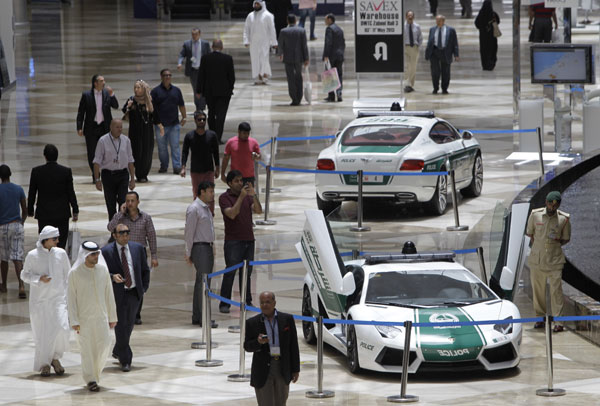Perks helps cushion wealth gap
UAE citizens all enjoy tax-free incomes and subsidized fuel
The United Arab Emirates has the world's tallest building, an artificial indoor ski slope and man-made islands shaped like the world. Dubai's fleet of police cars includes a $2.5 million Bugatti Veyron and a $500,000 Lamborghini Aventador.
Look past the blinding glitz, though, and you discover a gulf separating the elite and their riches from most Emiratis. Yet, in contrast to much of the world, a note of complaint is seldom heard here.
The reason is simple: Most Emiratis live lives of comfort that they owe to a bounty of perks and benefits from the government.
The welfare system, established more than four decades ago under Abu Dhabi's Sheik Zayed bin Sultan Al Nahyan, helped forge long-standing political loyalty.
"We came from this hard life, but because of this manmay God rest his soulwe now have a good, beautiful life," said 60-year-old Jumaa al-Shami, who lives in the northern emirate of Umm al-Quwain.
The question is how long it will last. Officials and economists warn that the lavish government spending that has long sustained a robust Emirati middle class could eventually be curtailed.
Analysts say the UAE's economic viability requires guiding more Emiratis into self-sustaining private businesses and weaning them from the state's openhanded patronage.
The government benefits that Emiratis have long enjoyed would be unthinkable in most of the world: Tax-free income, free high-quality healthcare, subsidized fuel, generous government-funded retirement plans, access to land to build homes with interest-free loans, and free higher education, even when pursued abroad.
To ease marriage costs, the government gives Emirati men $19,000 when they marry an Emirati woman. A debt settlement fund provides a one-time bailout to entrepreneurs who need it. On some occasions, the UAE's rulers have paid the debts of Emirati nationals ahead of major holidays.
Welfare society
The welfare system emerged when seven emirates joined to form the UAE under Sheik Zayed's leadership. Lifting Emiratis from poverty through a lifetime of aid coincided with transforming the UAE from a nation of disparateinto one of the world's leading investment and commercial hubs.
"The federal government is a huge welfare society and welfare state," said Abdulkhaleq Abdullah, a professor of political science at Emirates University. "This is a fact of life, and people appreciate that."
The UAE's three most developed emiratesAbu Dhabi, Dubai and Sharjahhave managed to attract global experts to help transform themselves into sparkling metropolises. Until recently, the four other emiratesUmm al-Quwain, Fujairah, Ras al-Khaimah and Ajmanstill had dirt roads and endured electricity outages and substandard health care facilities.
Even with gaping disparities among the seven emiratesand a constitution that defines each emirate as its own economic unit entitled to its own natural resourcesrevenue from Abu Dhabi's vast oil reserves tends to flow into the federal budget and across the country.
Nearly 90 percent of Emiratis who work are employed by the government, which provides long-term job security along with far more disposable income than workers in most other countries receive.
Increasingly, though, the government appears intent on scaling back its support. As part of that effort, the UAE has embarked on a plan to encourage the private sector to allocate training and jobs for Emiratis who would otherwise look to the government.
Most Gulf states have high birth rates, so the collective cost of government benefits is accelerating.
|
Visitors pass by a Lamborghini Aventador (foreground) and a Bentley Continental GT Coupe, both used as police cars, in Dubai. Although the UAE is one of the wealthiest countries in the region, the gap between its richest families and everyone else is vast. Kamran Jebreili / Associated Press |



















